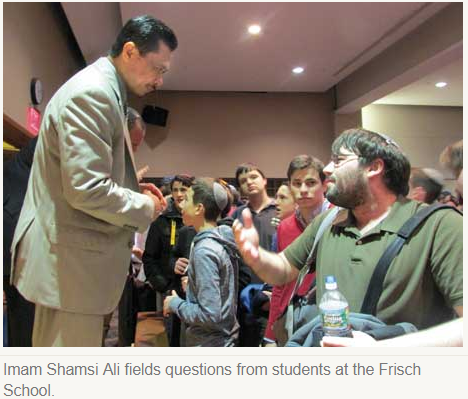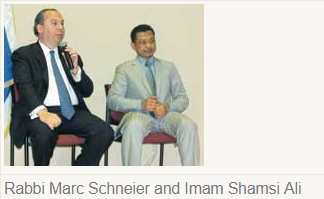
New Jersey Jewish Standard
By Larry Yudelson
A rabbi and an imam walk into the Frisch School together…
 Jewish-Muslim dialogue went to a yeshiva high school, as Rabbi Marc Schneier and Imam Shamsi Ali appeared at an assembly at the Frisch School in Paramus last Wednesday.
Jewish-Muslim dialogue went to a yeshiva high school, as Rabbi Marc Schneier and Imam Shamsi Ali appeared at an assembly at the Frisch School in Paramus last Wednesday.
It was the first time Frisch hosted a Muslim speaker – and the first time the duo, who have written a book together, brought their Muslim-Jewish dialogue to an American Jewish school.
Rabbi Schneier is the founding rabbi of the Hamptons Synagogue in Westhampton, N.Y. Imam Ali, who formerly led Manhattan’s Islamic Cultural Center on East 96h street and now heads two smaller congregations in Queens, noted the connection between the word “Beit Midrash” – the school’s study hall – and the word madrassa, meaning religious school, that he attended as a youth.
The Imam’s madrassa in his native Indonesia, however, was far stricter than Frisch: It was a single-sex boarding school, which its students left to visit home only twice a year.
 “The process of learning was not only inside of the classroom, but outside of classroom,” he told the Jewish Standard.
“The process of learning was not only inside of the classroom, but outside of classroom,” he told the Jewish Standard.
The two religious leaders appeared under the auspices of the Foundation for Ethnic Understanding, a group Rabbi Schneier, founded 25 years ago to advance black-Jewish dialogue. The foundation expanded its mandate to Jewish-Muslim dialogue in the last decade, after Rabbi Schneier was challenged to do so by his partner in the foundation, hip-hop music magnate Russell Simmons.
When the rabbi and the imam first met, at a television studio where they were providing Jewish and Muslim perspectives on Pope John Paul II, “we shook hands, barely looking at each other,” Imam Ali recalled. “Both of us had past prejudiced views about each other.”
But their dialogue led to friendship. Last year a book they wrote together was published; it’s called “Sons of Abraham: A Candid Conversation about the Issues That Divide and Unite Jews and Muslims.”
“Out of the friendship that we had, we changed,” the imam said. “I used to have a lot of prejudicial views about the Jewish community. He completely changed me.”
Rabbi Schneier said, “I came to the table with clear biases and prejudices, having grown up in a very intense yeshiva environment: Muslims were the enemy, Muslims were to be demonized, Muslims were not to be trusted.
“I’ve been able to enlarge my horizons,” he said.
Rabbi Schneier characterized the discussion at Frisch as “a very open, frank, wonderful exchange.”
Many of the questions the high school students asked were what the Muslim leader had come to expect. Questions about the role of women in Islam, about terrorism, about jihad.
What surprised him was “a question from a boy who seemed to me very knowledgeable about Islam. He had a great understanding of the religion,” he said.
The imam said one student disagreed with his statement that “many Muslims misperceive Jews. “He said, ‘I have a lot of Muslim friends in Brooklyn and they have never talked evil about Jews,’” Imam Ali said.
There were parts of the presentation that were particularly geared toward the yeshiva students.
“We spoke about there being a tradition of written and oral law in Islam, as in Judaism,” Rabbi Schneier said. “I said we must be careful to interpret the Koran in a literal fashion, as we would not do with our own Torah.”
Imam Ali said the partnership is not just about helping American Jews and American Muslims understand each other.
“We are able to influence Muslims and Jews around the world to work together,” he said. “The most recent example, a few months ago, Jews and Muslims organized meeting meetings in Tunisia. While Jews have lived among the Muslim majority in Tunisia for more than a thousand years, this was the first formal religious dialogue between the two communities there.”
In Austria, where 800,000 Muslims outnumber 16,000 Jews, the Foundation for Ethnic Understanding organized meetings of Muslim and Jewish leadership. “Most of the Muslims have never met a Jew and know little about the Holocaust,” Imam Ali said. “The president of the Muslim association in Austria promised to organize a kind of Holocaust education program for the Muslim community next year.”
“The good news is that the journey has begun,” Rabbi Schneier said. “There are more and more Imam Shamsi Alis who are emerging around the globe, who are speaking out on behalf of the Jewish community.
“The point I was trying to get across to the students is that the work the imam and I are doing is about fighting for the other. A person who fights for his own rights is only honorable when he fights for the rights of all people. Here is an imam who speaks out against anti-Semitism and Holocaust denial, and a rabbi who speaks out about anti-Islamic bigotry.
“Usually, there’s someone who says, it’s lovely what you’re doing, but the imam is not a real Muslim because he’s not an Arab. I said that only 16 percent of Muslims are Arab. The largest Muslim population comes from southeast Asia, where this imam has been hailed by the governments of Indonesia and Singapore as their international spiritual leader,” Rabbi Schneier said.
“I gave the students a reality check: We live in a world of 14 million Jews and 1 billion Muslims. It behooves both groups to narrow the gap,” he said.
Copyright © 2025 Foundation For Ethnic Understanding. All rights reserved. | Privacy Policy